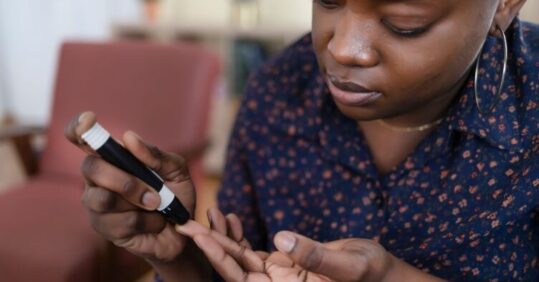Less than half of diabetes patients had all recommended checks last year

Fewer than half of diabetes patients had all recommended checks last year, an audit has found.
More needs to be done to address the backlog of routine diabetes care and avoid preventable deaths from the condition, the Diabetes UK report warned.
Too many patients with both type 1 and type 2 diabetes were missing on out routine care, having appointments cancelled and being left to manage their condition themselves, it said.
The report points to NHS audit data which shows in 2022, only 47% of diabetes patients had all eight recommended health checks done.
Figures show most ICBs have not yet recovered to pre-pandemic levels of completed health checks for HbA1c, blood pressure, cholesterol, serum creatinine, urine albumin, foot surveillance, BMI and smoking – the report added.
Related Article: ‘Concerning acceleration’ in drug-resistant gonorrhoea ahead of vaccine programme
However, progress has been made since 2021 when the real impact of the pandemic became apparent with only 38.5% of patients having all eight checks.
Improvement has been seen on all eight measures in the past year, the comparison of National Diabetes Audit Data shows, and some regions have managed to turn the tide.
But the report from Diabetes UK also surveyed 11,000 people with diabetes in England at the start of 2023 and found that 48% said they had difficulty managing their condition in the past year.
And people in the most deprived quintile were nearly 50% more likely to have had no contact with their healthcare team in over a year, compared to those in the least deprived, the survey found.
In addition, one in three people in the most deprived areas found it difficult to contact their diabetes healthcare team in 2022, compared to one-in-four in the least deprived.
Overall Diabetes UK estimates that in 2021/22 almost 2 million people did not receive all the checks they should have had.
Deaths from diabetes have increased by 7,000 a year compared to pre-pandemic levels with the charity saying it feared this was related to backlogs in care.
The report called on commitments from every ICB in England to address the backlog and address inequalities in access.
Related Article: Be alert to pancreatitis in patients using GLP-1 weight-loss drugs
Recent figures showed the number of people with diabetes in the UK had topped 5 million for the first time.
Chris Askew, chief executive of Diabetes UK said: ‘We know health professionals are working incredibly hard to give people the care they need, but they are just too stretched to provide the time and personalised support that is required – and it’s having a catastrophic impact.
‘The government must commit to tackling this diabetes care crisis in its Major Conditions Strategy, while local health systems should make it a priority in their plans.’
Dr Stephen Lawrence, a GP and associate clinical professor at University Warwick Medical School said almost every area ranging from the most to the least poor had reported a negative impact on delivery of the eight key care processes, through the Covid pandemic.
He added: ‘Whilst the national Diabetes audit figures they tell a story of the negative impact of Covid they also revealed that there has been an improvement across-the-board in the eight key care processes since 2021.’
Related Article: Lower gastrointestinal symptoms – supporting earlier diagnosis
Data shows that NHS Kent and Medway NHS, NHS Hampshire and Isle of Wight and NHS Buckinghamshire Oxfordshire & Berkshire West had managed to improve checks to pre- pandemic levels, he added, and there may be best practice to be shared.
‘The Covid pandemic has served to highlight the areas of health inequality that exist in our communities. It should not, however, escape our attention that the pandemic has also strongly demonstrated the commitment, and resilience of primary care to cope with and bounce back from such near cataclysmic events.’

See how our symptom tool can help you make better sense of patient presentations
Click here to search a symptom




